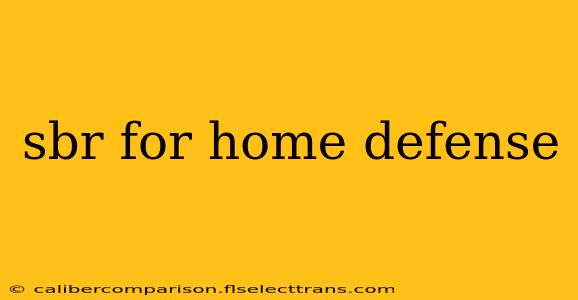Choosing the right firearm for home defense is a critical decision, demanding careful consideration of various factors. While many options exist, the Short Barreled Rifle (SBR) has garnered significant attention for its potential advantages in close-quarters combat. This guide will delve into the pros and cons of using an SBR for home defense, exploring its capabilities, legal considerations, and practical implications.
Understanding the SBR Advantage: Maneuverability and Control
The primary advantage of an SBR for home defense lies in its enhanced maneuverability within confined spaces. The shorter barrel reduces the overall length of the rifle, making it easier to navigate hallways, doorways, and tight corners. This is crucial in a home environment where close-quarters engagements are more likely. Further, the reduced length contributes to improved controllability, particularly during rapid firing or in stressful situations. This enhanced control translates to greater accuracy and less chance of unintended shots.
Key Features Contributing to Home Defense Effectiveness:
- Compact Size: SBRs are significantly shorter than standard rifles, ideal for navigating the complexities of a home layout.
- Improved Maneuverability: The reduced length enhances mobility and allows for quicker target acquisition.
- Increased Control: Easier handling reduces recoil and improves accuracy, even under pressure.
- Customization Options: Many SBR platforms allow for customization with accessories like lights, lasers, and stocks to tailor the weapon to individual needs and preferences.
Considerations and Potential Drawbacks
While SBRs offer significant advantages, it's vital to acknowledge potential drawbacks:
- Reduced Effective Range: The shorter barrel inherently reduces the effective range of the firearm compared to a standard rifle. However, for home defense, this is often less of a concern since engagements typically occur at close range.
- Legal Restrictions: Owning and using an SBR is subject to strict federal regulations in many countries, including the United States. These regulations necessitate registration with the relevant authorities and adherence to specific legal requirements. Understanding these laws is paramount before considering an SBR for home defense. Failure to comply can result in severe legal penalties.
- Cost: SBRs and the process of legally obtaining one can be more expensive than other home defense options.
Alternatives to Consider
It's important to note that SBRs are not the only viable option for home defense. Other firearms, such as shotguns and handguns, offer advantages depending on individual circumstances and preferences. The best choice ultimately depends on factors such as:
- Training and Experience: Familiarity with a specific firearm type is crucial for effective use.
- Physical Capabilities: The size and weight of the firearm should be manageable for the user.
- Home Layout: The structure of the home can influence the best choice of firearm.
Conclusion: Making an Informed Decision
The decision to use an SBR for home defense should be based on a thorough understanding of its capabilities, limitations, and the relevant legal framework. Careful consideration of personal preferences, training, and home environment is vital. Consult with experienced firearms instructors and legal professionals to ensure a safe and compliant approach to home security. Remember, responsible gun ownership includes understanding the implications of your choices and adhering to all applicable laws and regulations. This guide provides information; it does not constitute legal or professional advice. Always prioritize safety and responsible gun handling.

